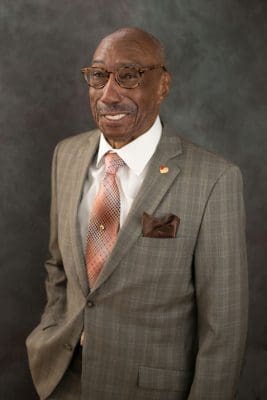Click HERE to view Rev. Richard Maraj’s guided meditation during the service.
Good morning again! [Congregation: “Good morning!”] You got a surprise this morning, huh? [Congregation laughs]
So I guess I’ll start with a joke. [Congregation laughs]
So there was this husband and wife who had been married for 60+ years. And between them, there were absolutely no secrets, except for one. The woman kept in her closet a shoebox that she forbade her husband from ever opening. But it was a point in her life where she was about to transition, and she was on her deathbed. And so she gave her husband the blessing to open the box. So he opened the box and he found within the box a crocheted doll and $95,000 in cash. [Congregation murmurs]
So he looked at his wife and just said, “What’s happening?” And she said, “My mother told me that the secret to a happy marriage was to never argue.” So she explained, “Instead of arguing, she said I should keep quiet and crochet a doll.”
And the husband was touched, because there was only one doll. And so, in his mind that meant she’d only been angry with him once in 60 years. “But what about all the money?” he asked.
She said, “Oh. That’s money I made from selling all the other dolls.” [Congregation laughs and applauds]
Have you ever been angry? In 60 years …
So today is the culmination of our series on love for this month of February. And throughout the month, at one point or another, Rev. Maraj has covered [many topics about love.] He also talked about seeing with eyes of love and also about healing the emotional body, and finally about the Spirit of God within you, which is something we talk about quite frequently in this church.
So today is the conclusion of all of those. And today we want to move it to a level of MASTERING LOVE. The idea of mastering love is what I believe is the next level. And what I mean by that is: That means that we have to spread love. And by spreading love, I’m talking about living love.
Living love is a challenge that we all have difficulty with sometimes. We can claim it as our own, but actually putting it into expression is a whole different idea. And it’s something that we aren’t particularly comfortable with. Or, speaking of myself, I know that I’m not comfortable with it. I have two incredible kids who are now 55 and 54. And throughout the early childhood years all the way up to probably about the age of 40 or 45, I don’t consciously remember ever saying to either of them, “I love you.” I don’t ever remember ever saying to my parents, “I love you.” There was this assumed idea that I loved them and there was this assumed idea that they loved me, but the words were never spoken.
And today I’m here to make the argument that it’s time for us to speak the words. And we cannot only speak the words, but we can actually live the words when we live in a loving way with those who are our neighbors.
Can you love with every iota of your being? That’s a challenge that I believe this world is ready for today! And encompassed in that love is a wonderful idea that we call forgiveness. Can you forgive the hurts and the injuries that you’ve experienced in a lifetime? Can you forgive yourself for the mistakes that you’ve made throughout the course of your living experience? Can you forgive your neighbors for the mistakes that they have made?
These are the challenges that enable us to live a life of love “under pressure,” as I like to say.
In secular love — in secular life — love has been given many labels, and one of the most frequently expressed labels that I’ve heard is, “Love is a many splendored thing.” And, indeed, it is!
But two of the most potent advocates of love in the Scriptures are Jesus, and ironically, the Apostle Paul. And Jesus kind of arrived at the love process automatically. History says that he was a child who grew up around loving adults; always lived within a loving community of people who loved him and appreciated him for who he was.
And Paul was like many of the people in our modern-day world. He had to work to find himself and to find love. He then had to work at love in order to get to the point where he could preach love in the churches. And at the moment he began to do that, he also had to acknowledge all of his prejudices and his hatred that he held for a group of people, and then release those prejudices and hatreds and replace them with love.
What both Paul and Jesus had in common, though, was that they both taught that love is an action-oriented process, which means that we can’t just walk around thinking that we are living in love. We actually have to live it! Love is the activity of God. Love is the activity of Spirit. That love is the expression of what the Scripture calls “Holy Spirit.”
And the world that we live in today — which is challenged in pretty much every area of the world — requires that we go a little deeper and that we get ourselves to a point of being willing to express that love. This is the most diverse planet in the solar system that we know of: all of these different forms of life and love that are populated on this planet. It’s incredible! But the level of appreciation of that diversity: that’s a whole different ball game.
So today I want to challenge you to live a life of love.
Henry Miller said, “The only thing we never get enough of is love. And the only thing we never give enough of is love.” If that is true, then the next question is: Why? The next question is: Why?!? The only person who can answer that question is each one of us. Each one of us in this human family are the only ones who can answer that question.
Many people throughout the known history of this world have suggested that we need more love. We need more love in the world; I’ve heard it a million times in my 80 years on this planet. But what I have also seen and understood is that very few people have taken on the challenge to create that love. And maybe that reality happens because it’s easier to talk about love than t is to actually be loving, and to do love, and to give love, and to share love. To practice love.
In the northern part of Kentucky there was — up until the end of last year — a woman by the name of Gloria Jean Watkins. She’s been noted as an American scholar; a teacher; an activist; an author who wrote under the pseudonym “Bell Hooks.” She had an interesting take on love, and the many different interpretations of love.
In her work with abused and neglected women and children, many – if not all — of the abusers and neglecters claimed to her that they loved the people that they abused and neglected. But they felt they had to do what they did to them because it was their wife, their children, their elder relatives and, consequently, they had the right to punish them — or correct them — because they loved them, and because society often teaches that we have no control over our feelings.
“Yet most of us,” she said, “accept that we choose our actions. Most of us accept that intention and will inform what we do. We also accept that our actions have consequences.”
In other words, what she’s saying is: Love has some standards to it. And the breakdowns in love only occur when those standards are not adhered to or when they are not clear. Ironically, clarity requires some effort. And it requires some energy and willingness and some empathy and respect. And oftentimes some humility: humility and understanding that none of us are perfect, so thereby, it is wisdom for us to be respectful and loving towards those who are in our human family around us.
Professor Watkins’ summation was, and I quote, “Love is as love does.” Love is as love does.
Jesus said the Scriptures’ standard for love in the Gospels. And the Apostle Paul kind of followed up with those same standards in his later work with the churches. And Paul stumbled with those teachings, but he did manage to stay the course until love became his banner, so to speak.
And Jesus’ banner statement was simply, “Love thy neighbor as thyself.”
But Paul was a bit more eloquent, because he’d had the advantage of watching Jesus; he’d had the advantage of education; he’d had the advantage of history. And so finally, in his realization of himself and the practice of love, he penned these words. He said, “Love is patient and kind. Love does not envy or boast. It is not arrogant or rude. And it does not insist on its own way. It is not irritable and it does not rejoice at wrongdoing. But it rejoices with the truth.”
So in his words, you can see the evolution of an understanding of how this power that we all sort of take for granted has the ability and the capacity to, not only change lives, but to change the world.
This morning I mentioned that one of my favorite persons who I admire as a person of love is former president Jimmy Carter. Ironically, President Carter got himself elected as president of the United States. And he thought: with enough love, he could change the political system and ideology of this great nation. But he met resistance at every turn. So the thing that he established that has given him his crown, so to speak, is the Peace Accord. And that doesn’t sound like much in the political arena, but then he went home to Plains, Georgia, and he began to build houses for people who were homeless. And he spent the rest of his life, pretty much up until the past couple of years, helping to build houses for the homeless. What greater expression of love can there be for another human being? To sacrifice and to do something for others who are in need?
Love is a powerful force. It can change the world … and it has changed the world numerous times and under numerous circumstances. But then we fall asleep. And I say now is the time to wake up!
In the closing for the book that we used for the messages for this month, the author — in his foreward — had this to say. He said, “To my parents, my children, my siblings and the rest of my family with whom I am bonded, not only by love, but by blood; and to my ancestral roots and to my spiritual family, with whom I am bonded by our decision to create a family based on unconditional love and mutual respect and the practice of the mastery of love; and to my human family, whose minds are fertile for the seeds of love contained in this book; may those seeds of love flourish in your life.”
To you, my family: May those seeds of love flourish in your life. God bless you!


